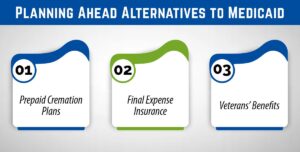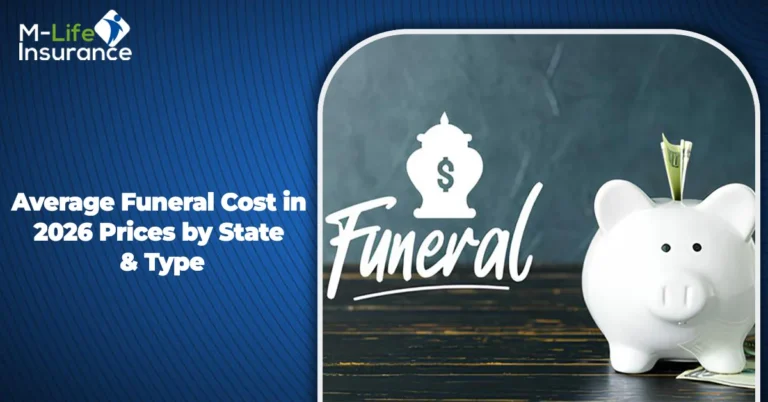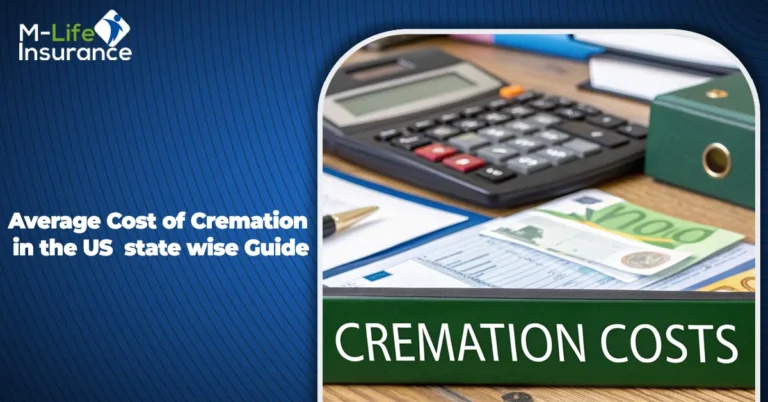Last Updated on: February 17th, 2025
- Licensed Agent
- - @M-LifeInsurance
Introduction
The passing of a beloved person becomes extra burdensome because cremation costs generally increase the overall stress. Many families wonder: Does Medicaid cover cremation? The answer is not straightforward.
The healthcare program that Medicaid represents does not fund cremations since it serves health functions rather than acting as a funeral expense program. Regardless of state regulations, several programs arranged by Medicaid and government programs exist to offer financial support for cremation expenses. The level of benefits available with Medicaid coverage differs depending on the specific state locations together with local funding sources. Local social services departments, together with programs for indigent burials, might provide financial support.
Why This Matters
Low-income families face an expensive challenge when dealing with cremation costs, which fall between $1,000 and $4,000. Numerous households struggle to meet basic funeral expenses when they lack financial backing. Families can better plan their arrangements when they understand what assistance programs exist to help relieve their financial obligations.
The Medicaid office and non-profit organizations in your state assist people seeking funeral arrangements through cremation. Also, check with local funeral assistance groups to determine other available resources. Families who understand these assistance options can prioritize their grief process by minimizing their stress about paying unknown costs.
Medicaid’s Role in Cremation Costs
Cremations create financial difficulties for low-income families since funeral costs tend to be expensive. Medicaid functions as a healthcare program, yet some states utilize Medicaid-related or state-funded programs to provide burial or cremation support. The level of coverage does not have a universal guarantee and shows significant differences among various locations.
Does Medicaid Cover Cremation Costs?
Direct funding for cremation through Medicaid does not exist, though limited financial help may come from state-funded initiatives. Financial support for cremations exists under state guidelines and funding availability.
Here are some state-specific examples:
- California: Through the County Indigent Burial Program, the government will pay up to $1,000 to cover cremation costs.
- New York: The state lacks a statewide program, though individual counties deliver minimal assistance for cremation.
- Texas & Florida: The only counties assisting with their programs offer support, especially to needy persons.
The availability of help can be determined by contacting both the local Medicaid office and county social services.
Eligibility Requirements
Anyone seeking state-funded burial or cremation support must fulfill these requirements:
- Income limits: Usually at or below 138% of the federal poverty level (FPL).
- Asset restrictions: Many states require that an individual’s countable assets do not exceed $2,000.
Medicaid vs. Medicare: What’s Covered?
The purposes of Medicaid and Medicare differ when providing financial assistance for cremation expenses. People who look for financial aid to cover final arrangements need to understand how Medicaid and Medicare differ.
Does Medicare Cover Cremation?
An individual must pay their cremation expenses, as Medicare never provides any coverage for this service. The Medicare health insurance program offers coverage for seniors and disabled individuals, yet it restricts payment to medical health expenses only before death, including hospital visits or hospice care. The Medicare program excludes funeral expenses as well as costs for cremations.
Families need to look for alternative ways to fund cremations because Medicare Advantage (Part C) plans do not offer funeral benefits.
Why Medicaid Is Your Only Option
The Medicare system differs from Medicaid since it targets people with low income while specific states occasionally grant restricted funeral or cremation support. Through Medicaid-funded programs, states and counties might provide financial assistance, thus making it the sole government-funded service for those who need help with cremation expenses.
The best solution for people facing high cremation costs is to investigate assistance from state Medicaid programs as well as indigent burial funds maintained by counties and nonprofit organizations that may offer support. Knowledge about these contrasts enables families to find suitable financial help during times of need.
Who Pays for Cremation If There’s No Money?
Several assistance programs together with different funding choices exist to help families afford cremation costs when regular expenses are not sufficient. Here’s what to explore:
State & County Programs
The public sector runs free burial and cremation services through indigent programs for low-income residents in most states and counties. Free or affordable cremation services from these programs exist to serve individuals who match the qualification requirements and have financial challenges.
- How to Apply: Contact your local social services department or county coroner’s office to check eligibility and apply.
Nonprofit & Religious Organizations
There are many non-governmental organizations and faith-based organizations that assist families who are having a hard time paying for cremations. Some well-known options include:
How Much Does Life Isurance Cost?
- Catholic Charities – Offers funeral assistance in certain locations.
- The Cremation Society – Offers low-cost services and support services.
- Local Churches & Religious Groups – Some of them offer financial support or affordably priced cremation services to the people who need it.
Crowdfunding & Payment Plans
For families who fail to get help, there are other ways of funding and fundraising, as follows:
- Crowdfunding platforms like GoFundMe allow friends and family to contribute.
- Funeral homes often offer payment plans, breaking the cost into manageable installments.
Average Cremation Costs & How to Save
The cost of cremation varies based on the services chosen. Families looking for affordable options should understand the breakdown of expenses and ways to reduce costs.
Breakdown of Cremation Expenses
- Direct Cremation: $1,000–$2,500
- The cheapest one and the funeral service that includes only the process of cremation.
- Memorial Service: +$500–$2,000
- In case the family decides to have a ceremony, other expenses that may be incurred are rental of the hall, charges for an officiate, and printing of fliers.
Other expenses may include the costs of getting death certificates, means of transport, and the cost of procuring the urn, which also contributes to the overall cost.
Low-Cost Cremation Tips
There are ways to cut costs even when choosing cremation for the family’s beloved one:
- Opt for Direct Cremation – This skips embalming, viewings, and expensive caskets.
- Choose an Affordable Urn – Funeral homes offer high-priced urns, but budget-friendly options are available online or through third-party sellers.
- Compare Prices – The FTC Funeral Rule allows families to request price lists and choose the most affordable provider.
- Look for Local Assistance – Some counties, religious groups, and charities help cover cremation costs for those in need.
Families should take time and strategize to obtain a noble but economical send-off for their kin.
Planning Ahead: Alternatives to Medicaid
For those who may not qualify for Medicaid cremation assistance, planning can help ease the financial burden on loved ones. Several alternatives exist to cover cremation costs and ensure a dignified farewell.
Prepaid Cremation Plans
Prepaid cremation plans enable people to secure today’s prices for their funeral expenses, thus protecting them from potential future inflation increases in funeral costs. Funeral homes present prepaid cremation plans through which customers can make installment payments.
Pay close attention because different state regulations exist; hence, it is crucial to verify consumer protection measures and confirm that the funds stay securely in trust accounts.
Final Expense Insurance
Burial insurance goes by two names: final expense insurance, and it represents minimal life coverage designed to pay funeral costs during the end of life.
- Insurance policies deliver payments between $5,000 and $15,000 that cover funeral expenses like cremation services along with funerary expenses.
- These policies provide both affordability and eligibility access, even to seniors who have health conditions.
Veterans’ Benefits
The VA provides financial support to eligible veterans who choose cremation as their burial method.
- $300–$2,000 in assistance, depending on service-related factors.
- Free burial in a national cemetery, which includes a marker and flag.
To receive VA benefits, families need to contact the Department of Veterans Affairs at their nearest regional office. The advanced financial arrangements between families create a smooth and worry-free money management plan for the future.

FAQs
Many families have questions about cremation costs and Medicaid assistance. Below are answers to some of the most common concerns.
Q: Will Medicaid pay for cremation in Texas?
The state of Texas lacks a Medicaid benefit for cremations, although selected counties provide burial funding amounting to $1,500 through their County Indigent Burial Program. Each location establishes its requirements for financial need to determine recipients eligible for benefits. Local social services offices need to be contacted for information about their availability of services.
Q: What if I can’t afford cremation and don’t qualify for Medicaid?
People without Medicaid benefits or state assistance can choose body donation to scientific research. Free cremation follows the donation process because medical research programs offer this service. The process serves as a dual benefit where your donation supports science research and simultaneously lowers expenses.
Q: Does Medicaid cover cremation urns?
Rarely. The majority of state assistance programs allow beneficiaries to receive standard cremation services consisting of cremation and transport of the body for funeral proceedings. Separate urn purchases are necessary since most devices do not include one, but families can find affordable choices through third-party sellers and online stores.
Conclusion
Medicaid provides state-based assistance for cremation, but the coverage remains constrained. Although many states operate benefit programs through county administration, various states lack uniformity in their offerings. The indigent burial programs of some states provide minimal financial assistance for cremation, yet most families must explore alternative funding sources due to Medicaid restrictions. Plans require knowledge of state and county programs alongside their qualifications and restrictions.
Essential to this process is planning ahead because it prevents your loved ones from facing increased costs unexpectedly. Prepaid cremation plans let you secure present-day funeral rates, which will protect you from future price increases due to inflation. Your planned arrangements for cremation services and final arrangements ensure the proper execution of your choices when combined with financial relief for your family regarding unplanned expenses.
The policy known as final expense insurance provides an alternative way to finance cremation expenses. The insurance benefits of $5,000–$15,000 from specific burial policies serve as an affordable option for future financial planning.
The essential thing is to develop a strategic approach in advance. Any steps you take toward prepaid plans or insurance coverage at present will work to provide financial protection for your family in challenging moments.

Joyce Espinoza, Expert Life Insurance Agent
Joyce Espinoza is a trusted life insurance agent at mLifeInsurance.com. She’s been in the insurance industry for over ten years, helping people, especially those with special health conditions to find the right coverage. At MLife Insurance, Joyce writes easy-to-understand articles that help readers make smart choices about life insurance. Previously, she worked directly with clients at Mlife Insurance, advising nearly 3,000 of them on life insurance options.





